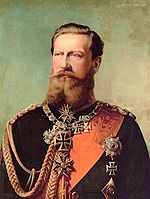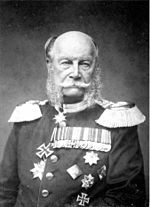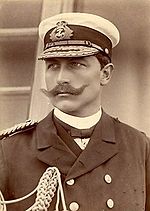- Year of the Three Emperors
-
 Kaiser Frederick III reigned for only 99 days during the Year of Three Emperors (9 March – 15 June 1888).
Kaiser Frederick III reigned for only 99 days during the Year of Three Emperors (9 March – 15 June 1888).
The Year of the Three Emperors, or the Year of the Three Kaisers, (German: Dreikaiserjahr) refers to the year 1888 during the German Empire in German history.[1][2][3][4] The year is considered to have memorable significance because of the deaths of two German Emperors, or Kaisers, leading to a rapid succession of three monarchs within one year.[1] The three different emperors who ruled over Germany during this year were Wilhelm I, Frederick III, and Wilhelm II. The mnemonic “drei Achten, drei Kaiser” (English: "three eights, three emperors") is still used today in Germany by children and adults alike to learn the year in question.[5]
Contents
Situation
Wilhelm I had been the King of Prussia before the formation of a German Empire due largely to Bismarck's efforts. As the monarch of the largest German state which had a key role in the unification, Emperor Wilhelm I had ruled over the German Empire ever since the unification of Germany on 18 January 1871. He lived until he was almost 91 years old and reigned over Prussia for 27 years and over Germany for 17 years. His son, Crown Prince Frederick William, was celebrated for his military actions because of his leadership during the wars fought to unify Germany.[6] Frederick commanded staffs and armies during the Second Schleswig War, the Austro-Prussian War, and the Franco-Prussian War.[1] Crown Prince Frederick William had just turned 56 before the year 1888. Frederick also had a number of children at the time, and his heir was named Wilhelm, after his grandfather. Wilhelm had just turned 29 before 1888.
Rapid succession
Early in the year, Emperor Wilhelm I died on 9 March 1888 after his long reign.[4] He was then succeeded by his son, Frederick William. Frederick William became known as Frederick III when he assumed the throne. Along with his military successes, Frederick III was a reputed liberal and married to the United Kingdom's liberal Princess Royal Victoria.[2] However, by the time of his father's death, Frederick was 56 years old and had already developed a terminal case of cancer of the larynx before he assumed the German imperial throne.[1] Frederick attempted to have it treated, but it was not successful. Due to this illness and subsequent treatment, Frederick could not talk during his short reign and had to communicate through writing. Frederick still accomplished some of his duties as emperor despite his protracted illness; however, he did not have any lasting effect upon Germany.[7] He died after only 99 days of rule on 15 June 1888. Frederick's son, Wilhelm II, then succeeded to the throne at age 29. Unlike his father, Wilhelm II did not have any liberal tendencies. Wilhelm II eventually led Germany into World War I and ruled until his abdication and the fall of the German Empire in 1918 at the end of war.[1]
See also
- History of Germany
- German Empire
- List of German monarchs
- Year of the Four Emperors
- Year of Three Popes
Notes
References
- Berghahn, Volker (2003) (in German). Das Kaiserreich: 1871-1914. Stuttgart: Klett-Cotta.
- Cecil, Lamar (1989). Wilhelm II: Prince and Emperor 1859-1900. Chapel Hill: University of North Carolina Press. ISBN 9780807818282.
- Hein, Arnulf (2006). ""Drei Achten, Drei Kaiser" - 1888. Trauergottesdienste der jüdischen Gemeinde in Leobschütz." (in German). Confinium (Germany) 1: 271–273. http://www.litdok.de/cgi-bin/litdok?lang=de&t_show=x&reccheck=313696.
- Kollander, Patricia (1995). Frederick III: Germany’s Liberal Emperor. London: Greenwood Publishing Group. ISBN 9780313294839. http://books.google.com/books?id=ODmUOa3aHrEC.
- Nichols, J. (1987). The Year of the Three Kaisers: Bismarck and the German Succession, 1887-88. Chicago: University of Illinois Press. ISBN 9780252013072. http://books.google.com/books?id=3gxoAAAAMAAJ&pgis=1.
- Pike, John (2008). "Kaiser Wilhelm II". GlobalSecurity.org. http://www.globalsecurity.org/military/world/europe/de-kaiser-wilhelm-ii.htm. Retrieved 2008-10-17.
- Tipton, Frank (2003). A History of Modern Germany Since 1815. London: Continuum International Publishing Group. ISBN 9780826449108. http://books.google.com/books?id=6jgCcG3fQrMC.
Categories:- 1888 in Germany
Wikimedia Foundation. 2010.


